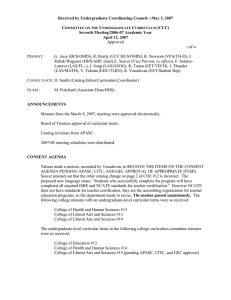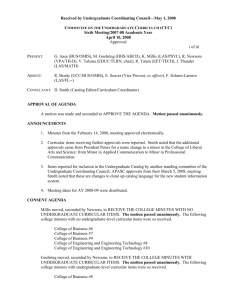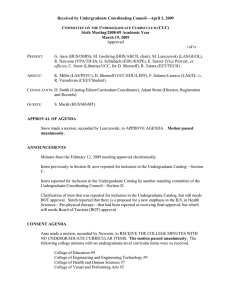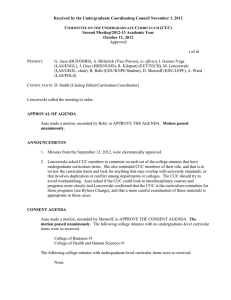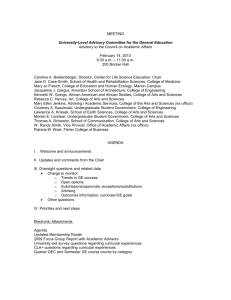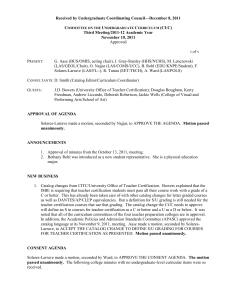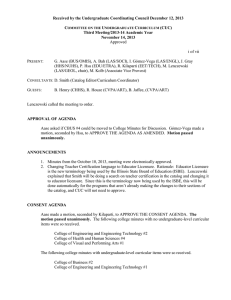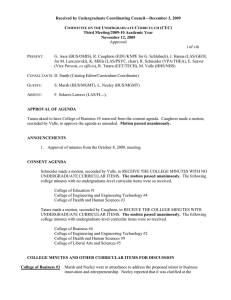Document 15173506
advertisement
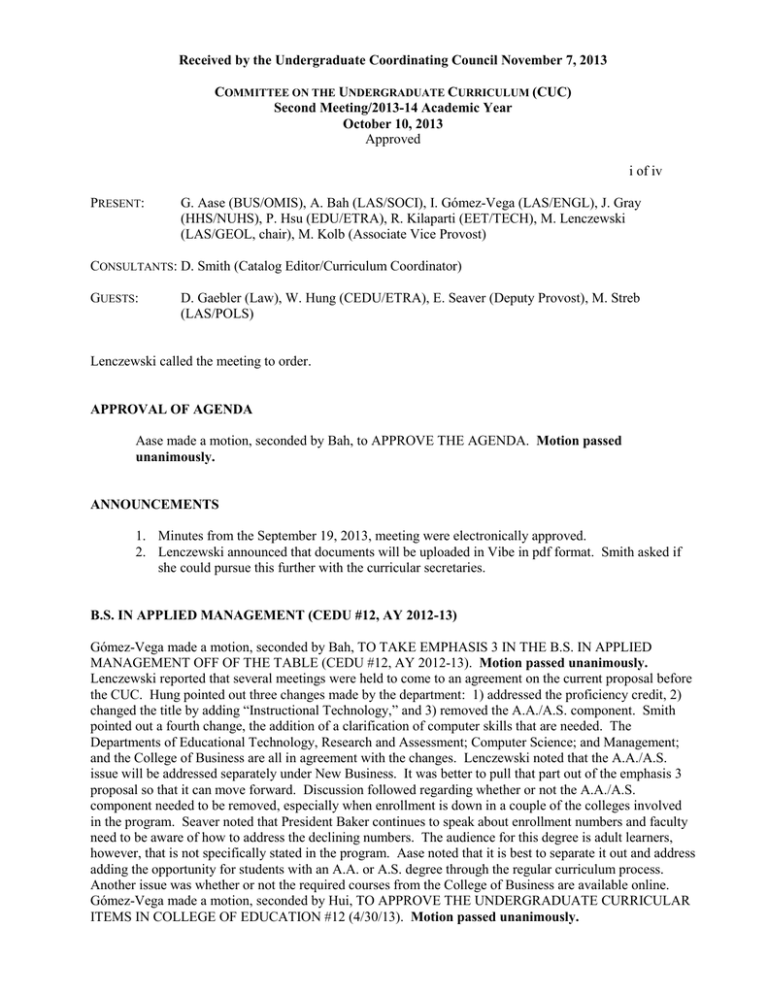
Received by the Undergraduate Coordinating Council November 7, 2013 COMMITTEE ON THE UNDERGRADUATE CURRICULUM (CUC) Second Meeting/2013-14 Academic Year October 10, 2013 Approved i of iv PRESENT: G. Aase (BUS/OMIS), A. Bah (LAS/SOCI), I. Gómez-Vega (LAS/ENGL), J. Gray (HHS/NUHS), P. Hsu (EDU/ETRA), R. Kilaparti (EET/TECH), M. Lenczewski (LAS/GEOL, chair), M. Kolb (Associate Vice Provost) CONSULTANTS: D. Smith (Catalog Editor/Curriculum Coordinator) GUESTS: D. Gaebler (Law), W. Hung (CEDU/ETRA), E. Seaver (Deputy Provost), M. Streb (LAS/POLS) Lenczewski called the meeting to order. APPROVAL OF AGENDA Aase made a motion, seconded by Bah, to APPROVE THE AGENDA. Motion passed unanimously. ANNOUNCEMENTS 1. Minutes from the September 19, 2013, meeting were electronically approved. 2. Lenczewski announced that documents will be uploaded in Vibe in pdf format. Smith asked if she could pursue this further with the curricular secretaries. B.S. IN APPLIED MANAGEMENT (CEDU #12, AY 2012-13) Gómez-Vega made a motion, seconded by Bah, TO TAKE EMPHASIS 3 IN THE B.S. IN APPLIED MANAGEMENT OFF OF THE TABLE (CEDU #12, AY 2012-13). Motion passed unanimously. Lenczewski reported that several meetings were held to come to an agreement on the current proposal before the CUC. Hung pointed out three changes made by the department: 1) addressed the proficiency credit, 2) changed the title by adding “Instructional Technology,” and 3) removed the A.A./A.S. component. Smith pointed out a fourth change, the addition of a clarification of computer skills that are needed. The Departments of Educational Technology, Research and Assessment; Computer Science; and Management; and the College of Business are all in agreement with the changes. Lenczewski noted that the A.A./A.S. issue will be addressed separately under New Business. It was better to pull that part out of the emphasis 3 proposal so that it can move forward. Discussion followed regarding whether or not the A.A./A.S. component needed to be removed, especially when enrollment is down in a couple of the colleges involved in the program. Seaver noted that President Baker continues to speak about enrollment numbers and faculty need to be aware of how to address the declining numbers. The audience for this degree is adult learners, however, that is not specifically stated in the program. Aase noted that it is best to separate it out and address adding the opportunity for students with an A.A. or A.S. degree through the regular curriculum process. Another issue was whether or not the required courses from the College of Business are available online. Gómez-Vega made a motion, seconded by Hui, TO APPROVE THE UNDERGRADUATE CURRICULAR ITEMS IN COLLEGE OF EDUCATION #12 (4/30/13). Motion passed unanimously. Received by the Undergraduate Coordinating Council November 7, 2013 COMMITTEE ON THE UNDERGRADUATE CURRICULUM (CUC) Second Meeting/2013-14 Academic Year October 10, 2013 Approved ii of iv CONSENT AGENDA Gómez-Vega made a motion, seconded by Gray, to APPROVE THE CONSENT AGENDA. The motion passed unanimously. The following college minutes with no undergraduate-level curricular items were so received. College of Education #1 College of Health and Human Sciences #1 College of Health and Human Sciences #2 The following college minutes with undergraduate-level curricular items were so received. College of Business #1 College of Health and Human Sciences #3 (pending APASC approval) COLLEGE MINUTES AND OTHER CURRICULAR ITEMS FOR DISCUSSION College of Education #2 In these minutes are new course proposals. Smith noted that APASC has approved the proposals. Aase made a motion, seconded by Hsu, TO APPROVE THE UNDERGRADUATE CURRICULAR ITEMS IN COLLEGE OF EDUCATION #2 (9/3/13). Motion passed unanimously. College of Education #3 In these minutes are new course proposals and a proposal to change the name of the Department of Literacy Education to Literacy and Elementary Education. GómezVega made a motion, seconded by Hsu, TO APPROVE THE UNDERGRADUATE CURRICULAR ITEMS IN COLLEGE OF EDUCATION #3 (9/17/13) PENDING APASC AND PRESIDENT BAKER APPROVAL. Motion passed unanimously. College of Liberal Arts & Sciences #1 The new track for the B.A. in English was noted. This does not need approval beyond the UCC. Gómez-Vega made a motion, seconded by Bah, TO APPROVE THE UNDERGRADUATE CURRICULAR ITEMS IN COLLEGE OF LIBERAL ARTS AND SCIENCES #1 (8/28/13) PENDING GEC APPROVAL. Motion passed unanimously. College of Liberal Arts & Sciences #2 New course proposals were pointed out. Bah made a motion, seconded byAase, TO APPROVE THE UNDERGRADUATE CURRICULAR ITEMS IN COLLEGE OF LIBERAL ARTS AND SCIENCES #2 (9/4/13). Motion passed unanimously. College of Liberal Arts & Sciences #3 Lenczewski pointed out a course revision in English where they are changing the designator, title, and description. Aase said that the changes don’t cross into other disciplines. Gray pointed out that there may be a problem for students in CHHS who currently need ENGL 250 and who are taking the course at community Received by the Undergraduate Coordinating Council November 7, 2013 COMMITTEE ON THE UNDERGRADUATE CURRICULUM (CUC) Second Meeting/2013-14 Academic Year October 10, 2013 Approved iii of iv colleges. She is concerned that if it changes to a 300 level that the community college course will no longer articulate into CHHS program. Also, if students cannot transfer a community college course for credit in ENGL 250/350, CUC members wondered if the department was prepared for the increase in demand for this course. Gómez-Vega made a motion, seconded by Aase, TO TABLE THE UNDERGRADUATE CURRICULAR ITEMS IN COLLEGE OF LIBERAL ARTS AND SCIENCES #1 (9/11/13) FOR ENGLISH TO CONSIDER THE ARTICULATION ISSUES AND POTENTIAL INCREASED DEMAND OF CHANGING ENGL 250 TO ENGL 350. Motion passed unanimously. College of Liberal Arts & Sciences #3 Streb explained the 3+3 program in the Department of Political Science and College of Law. The Department of Political Science was approached by the College of Law to develop a program that would allow political science students in the program to earn a B.A. or B.S. in Political Science degree and a Juris Doctor degree in six years. Both Dean McCord and Associate Dean Doederlein support the program. Students would fulfill all political science requirements in the first three years, earning 90 semester hours. In the fourth year, students would take the first year law course work, which would also count towards the remaining 30 credits for the bachelor’s degree. Streb added that the 3+3 program is a national trend and will assist in the recruitment of both undergraduate students for political science as well as the College of Law. Lenczewski pointed out that this would only apply to political science at this time. Gaebler said that this would enable the College of Law to recruit the top students from the Department of Political Science. Lenczewski asked what happens to students who decide they do not want to pursue a law degree. Streb said that the 3+3 program would have a separate major code and students who would want to switch out of the program would simply change their major to either the regular political science major or another major they are interested in. Lenczewski asked if a student could change their major to the 3+3 program and Streb said that a student could do that, but the advisor would need to work with that student to be sure they had the necessary coursework leading up to that fourth year and the law coursework. Kilaparti asked how the program allows a student to save a year and Streb said that students are counting the first-year law courses towards the electives for their bachelor’s degrees. Bah asked what are the admissions standards and Streb said that students need to have a cumulative GPA of 3.25 and to pass the LSAT with a score above the median of the previous year's matriculating class. It was also pointed out that this proposal will need APASC approval. Kilaparti asked what happens if a student doesn’t maintain that GPA and Streb said the student would still earn a bachelor’s degree in political science. Lenczewski asked if there were similar programs in the state and Gaebler said that there are. Aase said the proposal looks good and said it should also be marketed to transfer students. Streb said that a student with a clean transfer would be able to enroll in the program. Other transfer students could enroll in the program, but advisors would need to be sure they had the proper credits. Gómez-Vega made a motion, seconded by Kilaparti, TO APPROVE THE UNDERGRADUATE CURRICULAR ITEMS IN COLLEGE OF LIBERAL ARTS AND SCIENCES #4 (9/18/13) PENDING APASC APPROVAL. Motion passed unanimously. Received by the Undergraduate Coordinating Council November 7, 2013 COMMITTEE ON THE UNDERGRADUATE CURRICULUM (CUC) Second Meeting/2013-14 Academic Year October 10, 2013 Approved iv of iv OLD BUSINESS 1. APPM revisions. These will be discussed at a future meeting. NEW BUSINESS 1. B.S. in Applied Management. Lenczewski introduced proposed changes to the B.S. in Applied Management. Since the CUC is the curricular body, she is bringing the changes to the CUC first. The changes are: 1) adding the A.A./A.S. degree, 2) better define how proficiency credit is awarded, 3) update the list of core requirements to include prerequisites for other courses, and 4) add language for the B.S. in Applied Management to the Limited Admission/Limited Retention section of the catalog. She asked CUC for feedback, then the next step will be to send to the participating colleges and departments for their feedback. The last step will be to present the final version to the CUC for approval. Lenczewski further explained that the language for the Limited Admission/Limited Retention section of the catalog was based on other programs listed in that section. Seaver asked that this also be presented to the BSAM advisory group before it gets submitted to the colleges and departments, since they already have representation on the CUC. The coordinators of the emphases should also be consulted with. There was discussion about further revising the program to make it more an NIU degree and not tied as much to community colleges and adding another CUC member to the advisory group. Aase said that there are also issues from a business accrediting perspective that need to be addressed. Having formalized language regarding advising addresses at least one concern. Also, courses that could be substituted for the business courses could be considered. Seaver noted that the advisory group is planning a retreat, with at least one outcome being to establish bylaws for the BSAM. They can also consider these revisions. Lenczewski said she will keep the CUC informed on the work of the advisory group. This will stay on the agenda. Meeting was adjourned by acclamation at 1:50 p.m. The next meeting will be November 14, 2013, 12:30, Altgeld 225. Respectfully submitted, Donna M. Smith
